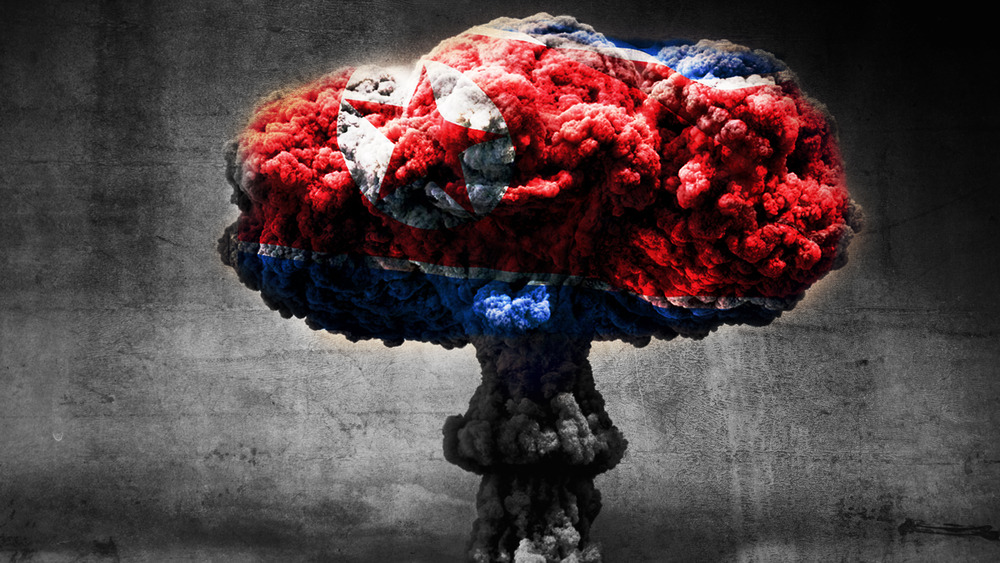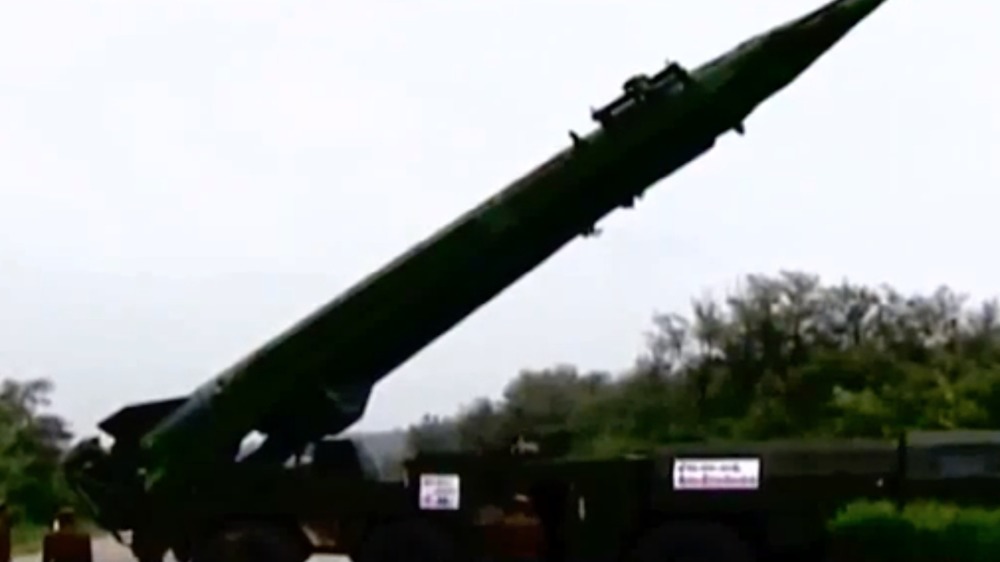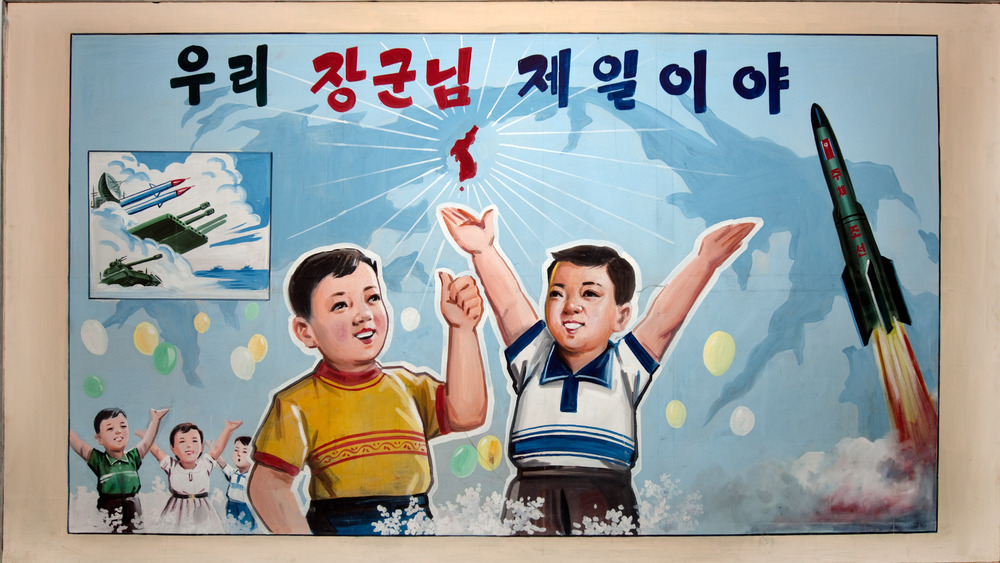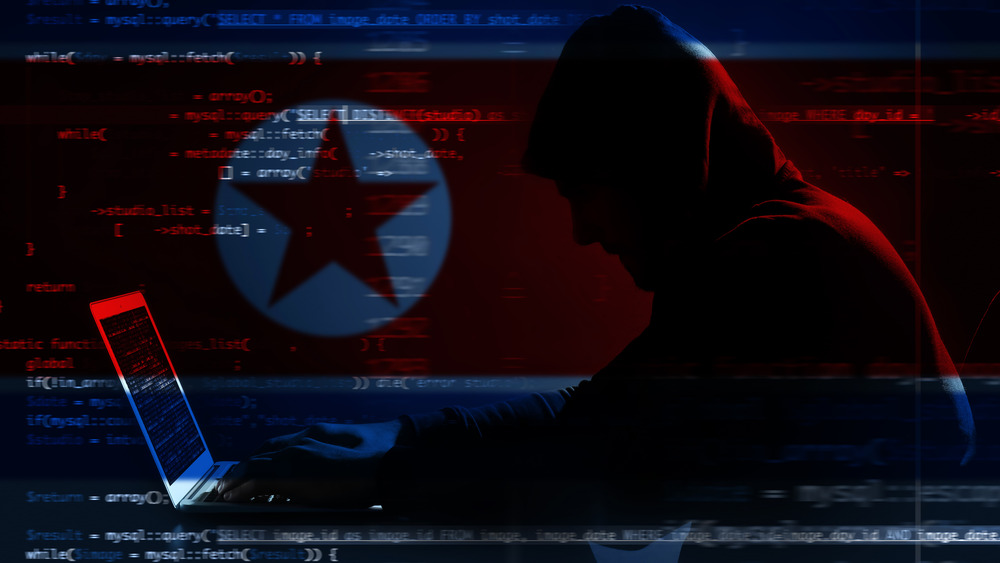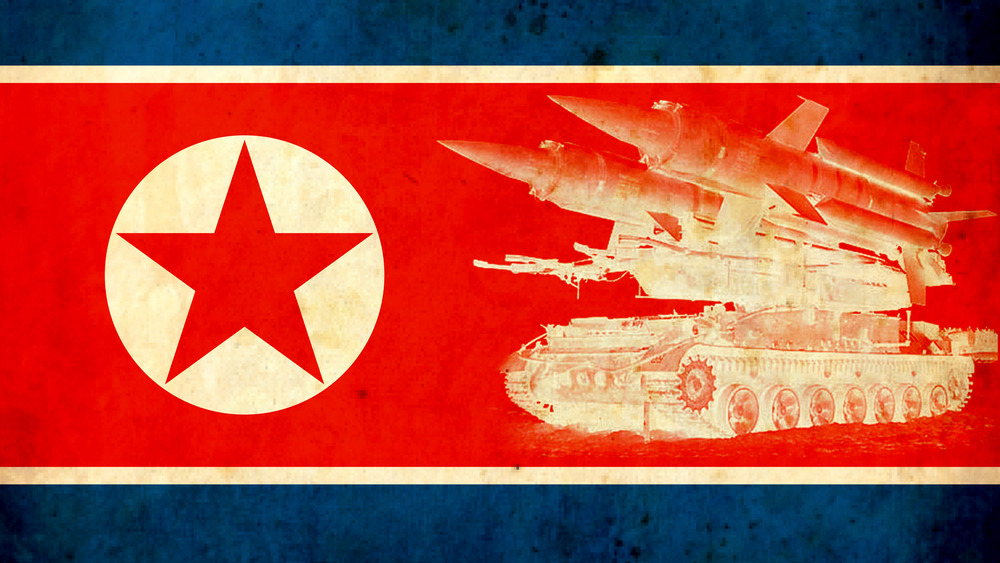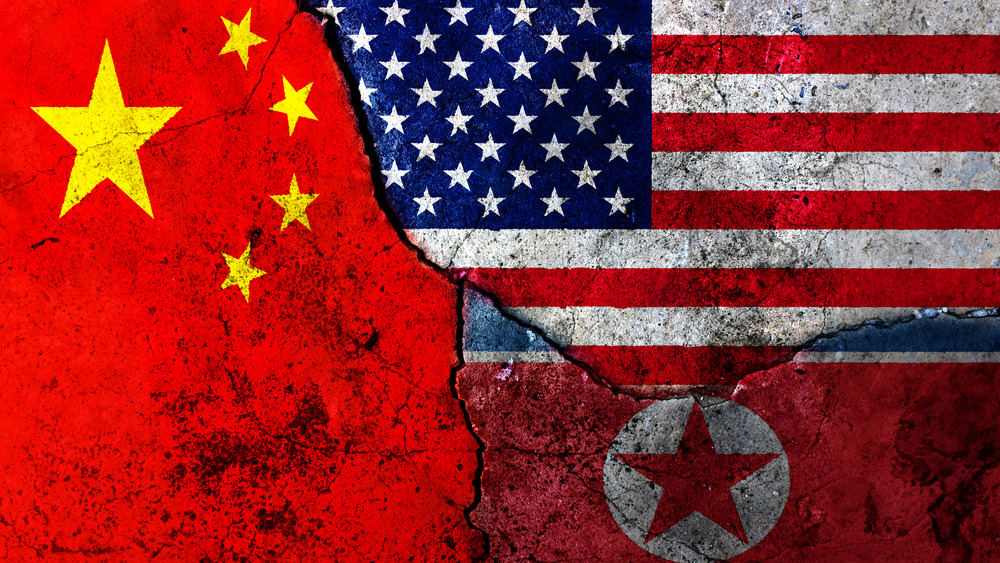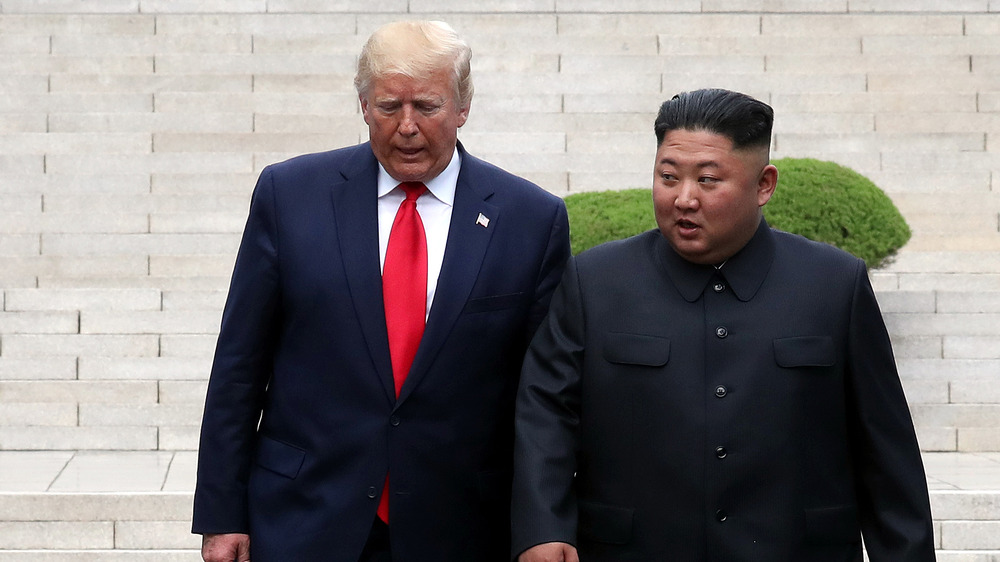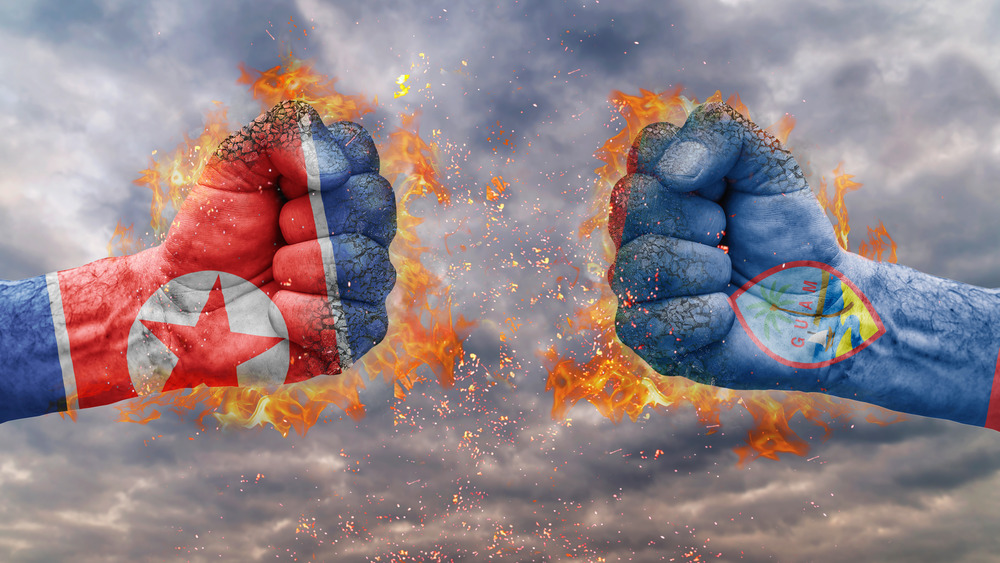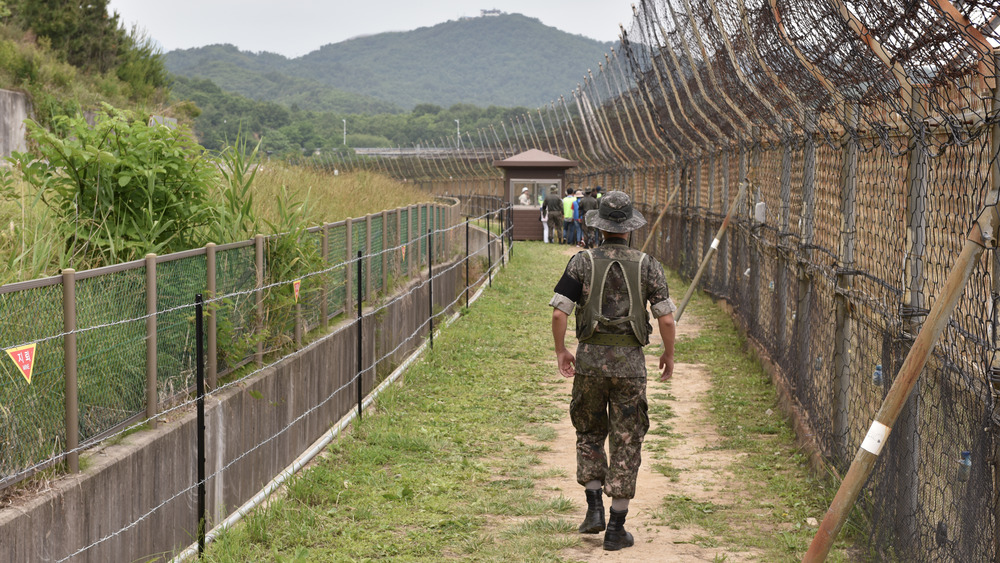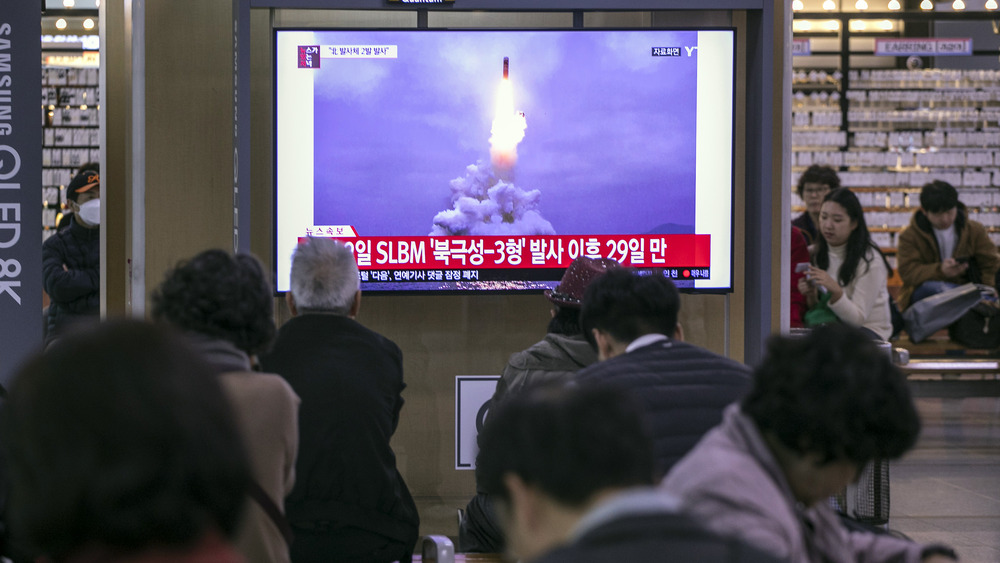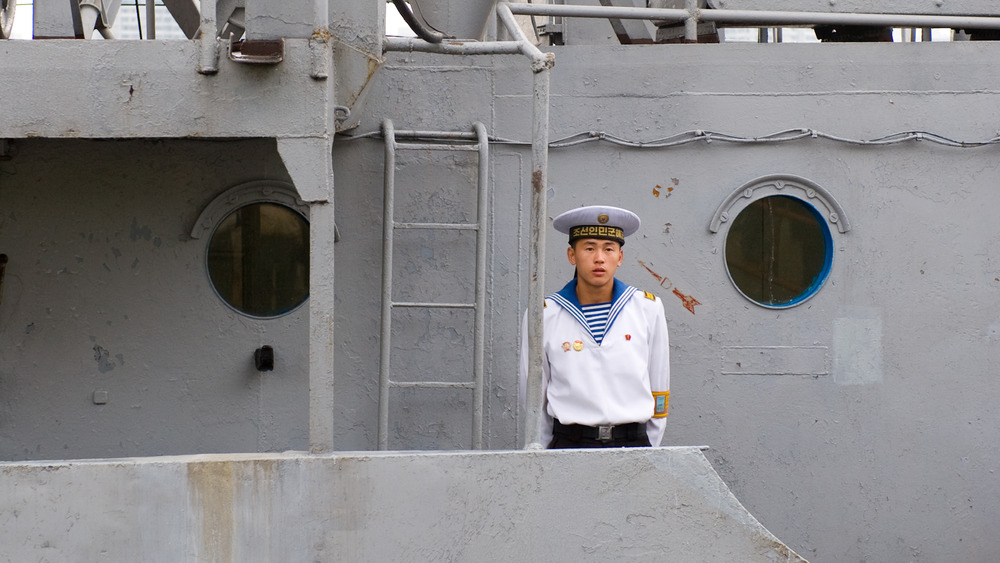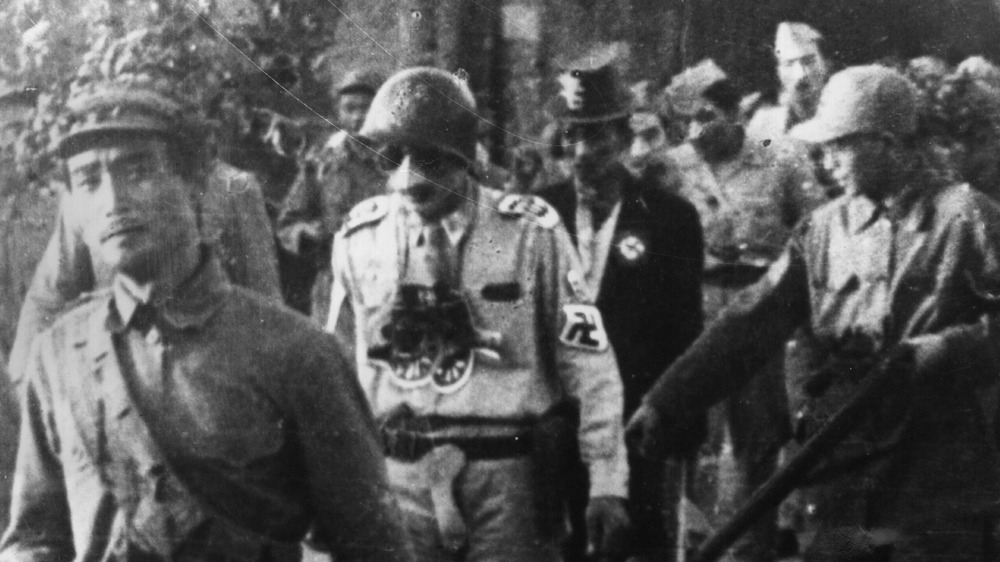The Biggest Threats North Korea Made To The US
The Democratic People's Republic of Korea (DPRK) is a place very few people know much about, and they kind of like it that way. Commonly known as North Korea, the hermit kingdom is one of the most repressive places on Earth. The United States fought one of its most brutal wars against North Korea when it invaded its neighbor South Korea in 1950. They've hated Americans ever since, and they let the world know frequently.
North Korea has been at the propaganda and hating America game for over 70 years now — during an actual war, the Cold War, and ostensible peacetime — and they've got seven decades of propaganda wins and fails, boasts that fell flat, threats that terrified. Three generations of North Korean leaders have been menacing the U.S., and here are some of the more comically toothless warnings, inflammatory rhetoric, and dangerous challenges they've posed.
North Korea destroyed the White House -- in a video they made
When Kim Jong-un took his father's, and grandfather's, place as leader, there was some hope that the young, western-educated heir to the hermit kingdom would bring much-awaited reform. Kim Jong-un was a nerdy fan of the NBA, schooled in Switzerland, and introduced his beautiful wife to the world in what The New York Times called a "Kate Middleton moment." Harvard University research fellow John Park told the Times that compared to his father, "Kim Jong-un has already shown a pattern of being more open and engaging." Many analysts and diplomats around the world were hopeful that North Korea would interact with the world more.
Which they did. But not always in the way the optimists had hoped. North Korea has become much more technologically advanced and not just in weapons technology. North Korean officials have Twitter accounts, according to ABC News, and even a YouTube channel with totally peaceful videos like "DPRK Vows to take Military Revenge on S. Korea for Slandering Socialist System." The Kim Jong-un regime has always produced propaganda, but under the new supreme leader they became more sophisticated and frequent and released online. Just in 2017, reported Newsweek, North Korea posted two separate videos online where missiles were depicted targeting and destroying the U.S. Navy and the Capitol, as well as the White House.
North Koreans are taught to hate Americans
Possibly the worst examples of North Korea's anti-American rhetoric isn't even aimed at Americans. Propaganda, after all, is best designed for use against one's own population so people in the DPRK are less taught that Americans are bad and more indoctrinated to violently hate Americans.
When they don't lie outright, the very language used in North Korean textbooks to describe Americans is inflammatory. Americans are usually "imperialists" in North Korean textbooks, according to the State University of New York at Cortland, unless they're "dogs" or "bastards." Newsweek reports that a mosaic outside of a North Korean museum depicts "a grandmother in traditional dress, hair askew, shaking her fist at the 'wily Americans' and calling on fellow North Koreans to seek 'a thousandfold revenge.'"
The Telegraph reported in 2017 on a supposedly popular North Korean video game, "Hunting Yankee," which does as the name suggests — the point of the entire game is to kill Americans. The cartoon "Squirrel and Hedgehog," according to the Independent, has been a popular children's show for decades in the DPRK and is awash in anti-American propaganda, like one scene in which "invading US flotation tanks being sunk by schoolchildren operating rocket launchers made out of pencils and protractors." A 2010 history book called The Sinful American Aggressors' Imperialism of Korea blames the U.S. for the Korean War, declaring, "The Americans are slaughterers who brutally massacred our people,"
North Korea threatens American movie theaters
North Korea is more than merely invested in filming propaganda. Former leader Kim Jong-il was obsessed with movies, to the point that he kidnapped foreign actors to star in his films and literally wrote the book on making movies in the DPRK. His son, current leader Kim Jong-un, is following in his father's propagandist and screen-loving footsteps, says CNBC. Having been educated in the west and coming of age in the internet era, he's basically the world's only nuclear-powered millennial. Kim Jong-un loves western movies. His favorites, according to what his former classmates told The Washington Post, were action movies, especially Jackie Chan flicks, and he tries to watch all the new releases.
Which may be why the regime's response to Seth Rogen's 2014 comedy, The Interview, the plot of which revolves around an attempted assassination of Kim Jong-um, was to, per the Brookings Institute, threaten "9/11-type attacks against theaters that showed the film." While they didn't perpetrate any physical attacks, hackers traced to North Korea — according to the South Korean Ministry of Defense, the DPRK has a 6,000-strong cyber army illegal everywhere but there — struck at Sony Pictures, the movie's producer, "and dumped confidential information, including salary lists, nearly 50,000 Social Security numbers, and five unreleased films onto public file-sharing sites." Like father, like son, because the Daily Beast says that Kim Jong-un's dad demanded the 2004 comedy mocking him, Team America: World Police, be banned in the Czech Republic.
North Korea's stripes remain the same for President Joe Biden
In seeming contradiction of its name, leadership in the Democratic People's Republic of Korea has thus far been a family affair. Three members of the same family have been in charge since the country's creation over 70 years ago. This does not appear to be changing anytime soon as Kim Yo-jong, sister of current leader Kim Jong-un, has been taking a far higher profile of late. She's been more public than her family members generally are — for instance, by attending ceremonies like the Olympics, to great international acclaim said CNN. Kim Yo-jong in March also issued her country's first official communication to the Biden administration, to much less applause from the world.
"We take this opportunity to warn the new U.S. administration trying hard to give off the (gun) powder smell in our land," she said according to US News & World Report. "If it wants to sleep in peace for [the] coming four years, it had better refrain from causing a stink at its first step." The U.S. secretary of state was visiting Asia to speak with allies like Tokyo and South Korea about common issues, like North Korea, and the joint military exercises the nations routinely conduct together to defend against potential mutual enemies, like North Korea. Pyongyang was obviously unhappy with this, so Kim Jong-un's sister basically told President Joe Biden to stop doing military drills with South Korea, which she called ""ridiculous, impudent and stupid."
After peace talks break down, North Korea threatens America with "Christmas gifts"
A central tenet of DPRK policy over basically its entire existence has been the acquisition of nuclear weapons, an ambition achieved in 2005 but which even decades beforehand was being used in diplomatic negotiations. As The Guardian reported back in 2005, when North Korea said it would stop pursuing nuclear weapons because Kim Jong-il saw what was happening in Afghanistan and Iraq, "the reclusive state promised to give up its main bargaining chip in return for energy, economic aid and a US promise not to attack." Well, they didn't.
Disarmament talks have become a frequent-ish characteristic of the region, and the "denuclearization" of the Korean peninsula is still leverage the North is willing to play as it continues to develop its nuclear arsenal. According to the Council on Foreign Relations, North Korea "could have between twenty and sixty assembled nuclear weapons, according to various estimates by experts," and they regularly test those weapons and the missiles that would deliver them.
When the latest disarmament talks with the U.S. fell apart in 2019, the dissatisfied North Koreans issued a statement saying, "it is entirely up to the U.S. what Christmas gift it will select to get." This reminded many analysts in the military and media, said NPR, of a July 4 nuclear test two years earlier that Kim Jong-un said was part of a "package of gifts."
North Korea threatens the U.S. with "the greatest pain"
Bellicose repartee frequently accompanies North Korean weapons tests, nuclear or otherwise, often following some sort of promise not to test weapons, nuclear or otherwise. The world routinely tries to punish the Kim regime for such tests and for violating international agreements it had made. These punitive measures are basically limited to economic sanctions, and North Korea basically ignores them. As the Council on Foreign Relations explains, just since 2006 the United Nations "Security Council has passed nearly a dozen resolutions, all unanimously, condemning North Korea for its nuclear pursuits and imposing sanctions." North Korea has reneged on every agreement, always blaming the U.S.
Even North Korea's only real ally and by far largest trading partner, China, joined the world in imposing further sanctions on North Korea every time. But the threats are always aimed at America. In 2017, as the BBC reports, a new round of sanctions was placed on the DPRK for testing another nuclear device. North Korea's ambassador to the UN responded by saying, "The forthcoming measures by DPRK will make the US suffer the greatest pain it has ever experienced in its history." This time even the Chinese condemned North Korea's bellicose repartee, with the BBC quoted their Foreign Ministry saying, "China will never allow the [Korean] peninsula to descend into war and chaos."
North Korea said that nuking America was "the only option left"
At the beginning of his presidency, Donald Trump had engaged in what might be charitably described as "unorthodox negotiations" with Kim Jong-un. The nuclear-tipped repartee between the two leaders, such as the famous "dotard" and "Rocket Man" quips or the times they called each other old and fat, somehow evolved, as the BBC said, "From enemies to frenemies." Unprecedented face-to-face meetings were scheduled and held between the two leaders where, Trump said of his Korean counterpart, "We fell in love."
The honeymoon was short. Within a year of the historic meeting, the negotiations were not merely stalled, they were going badly. By the end of 2019, the fiery rhetoric had returned. Kim Yo-jong, the chairman's sister, called South Korea an "enemy" in mid-2020 and then had the liaison office destroyed that North Korea had built with the South for further negotiations with that country as well as the United States.
Later that summer, after joint military exercises with South Korea, which Trump had promised to cancel but just scaled back instead, the North Koreans responded by threatening war. "No other nation on this planet than the Korean nation has so directly suffered from nuclear threats for so long," North Korea's state news said, according to US News & World Report. "The only option left was to counter nuke with nuke."
North Korea threatened to nuke Guam
In late 2017, the war of words between U.S. President Donald Trump and North Korean Supreme Leader Kim Jong-un was at its height. During a speech at the United Nations Trump warned that he could "totally destroy" the DPRK, reported CNN, to which their foreign minister reacted by calling him "President Evil" and "mentally deranged." At a photo op the next month, Trump claimed that "North Korea best not make any more threats to the United States. They will be met with fire and fury like the world has never seen."
"The US military action hardens our determination that the US should be tamed with fire," responded DPRK state media according to CNN, threatening to launch missiles at the U.S. island territory of Guam. They claimed that America was alone to blame for "pushing the situation on the [Korean] peninsula to the point of explosion." This is "not a new situation for Guam," explained Time. "Due to the heavy U.S. military presence there and its closer location than the U.S. mainland, North Korea has frequently threatened it in the past." In fact, according to NPR, in 2013 North Korea suggested that the Obama administration "should not forget" that they could strike the island, citing by name the U.S. military base there, and made at least three separate threats to the American territory that year.
North Korea killed U.S. soldiers for cutting a tree at the border
The Korean War came to a ceasefire in 1953, and the war is still technically ongoing, but the border between North and South Korea has been stable since then. It has not, however, always been peaceful. The Demilitarized Zone (DMZ) separating north from south is perversely home to the greatest biodiversity on the peninsula (no humans means more animals, per The Washington Post) and a huge number of troops on both sides. For nearly 70 years, thousands of soldiers have stared each other down and occasionally someone blinked, resulting in violence and death.
According to Military Review, almost 100 U.S., many times that many South Korean, and an unknown number of North Korean soldiers have died at the border since 1953. The most violent period was during 1966-1969, a period "labeled the 'Quiet War' by South Koreans," but the incident everyone remembers most happened ten years later.
A 40-foot tall poplar tree was impeding the view of a UN observation platform at the border. A team of South Korean laborers and American soldiers was sent out with axes to trim the tree. They were confronted by North Korean soldiers telling them to stop. "The branches that are cut will be of no use," said a North Korean officer, according to The Atlantic, "just as you will be after you die." More North Korean soldiers showed up, and the Americans were killed, their bodies left by the tree.
North Korea exports missiles and extorts the U.S.
"North Korea does not publish reliable National Income Accounts data," says Moody's Analytics, diplomatically describing how the nation "faces chronic economic problems." So while not much is known, their infrastructure is terrible, industry is mostly reserved for military uses, internal free trade is heavily restricted, and the country has been under nearly every type of international economic sanction at one point or the other. So they've been getting innovative with their revenue generation.
"For decades, North Korea has proliferated weapons, including conventional arms, ballistic missiles, and chemical agents...," according to Foreign Affairs. "...to desperate and unstable regions around the world in exchange for hard currency." They've been accused of selling chemical weapons to Syria, submarines to Iran, and nuclear technology, as well as conventional weapons, to both. This allows them to make money by circumventing sanctions, as well as destabilizing their enemies while gathering technical expertise.
Most of the rest of the world has been demanding that North Korea stop doing this, and negotiations to that end have taken place multiple times over the decades. The DPRK agreed to the Nuclear Nonproliferation Treaty, sort of, and then pulled out all together. They have repeatedly said, according to the Arms Control Association, that they won't stop exporting missiles until "the United States provide compensation for lost missile-related revenue." North Korean negotiators are fond of reminding the U.S. they are fully prepared for both "dialogue and war."
North Korea uses captured and tortured U.S. sailors for propaganda
The USS Pueblo was a U.S. spy boat on its maiden voyage when it was captured by the North Koreans in 1968. After a three-hour standoff in which one U.S. sailor died, the ship surrendered to the North Koreans, charged with violating North Korean territorial waters. "You're talking to the navigator," the Pueblo's retired navigator, Lt. Eddie Murphy, told NPR. "At all times we were in international waters."
The 82 American crewmembers were tortured and held for almost a year by North Korea. "My ear lobe on the right side was just hanging by a small part of the skin," said Murphy. "Head beatings, rifle butts and broomsticks — I had two chairs broken over my head," said another Pueblo veteran. Ultimately, by threatening the execution of every member of his crew, the ship's commander, Lt. Cmdr. Lloyd Bucher, confessed at a press conference in Pyongyang.
North Korea used the confessions — Bucher wasn't the only to falsely confess — for propaganda and, thus, proof of American aggression. They took many pictures of the sailors to show how well they were being treated. Unfortunately for the North Koreans, most of the pictures were unusable for propaganda because the Americans had their middle fingers extended in as many as they could get away with. They told their captors it was a "Hawaiian gesture for good luck" and were all beaten for a week when the Koreans caught on.
North Korea used prisoners of war for propaganda
At the beginning of the Cold War was the Red Scare, a period of literal purges of suspected communists in government and media, as well as general public paranoia. According to Smithsonian Magazine, this was really inflamed by the Korean War when American "prisoners of war had falsely confessed to using germ warfare against the Koreans, dropping everything from anthrax to the plague on unsuspecting civilians." Thousands more American POWs confessed to war crimes. Five thousand signed a North Korean petition to end the war. Twenty one refused to come home. North Korea publicized all of this, and Americans were astonished.
The only explanation was that they were being brainwashed, a term coined and idea hatched (by someone "who turned out to be an agent in the CIA's propaganda wing") just before the war started to explain why the Chinese Communist Party was being so successful in that country. Scientists "who actually studied the American POWs once they returned from Korea" came to a far more mundane explanation — "the men had been tortured." This didn't stop many in the public from being terrified of Soviet mind control, brainwashing become part of the popular lexicon. Some in the government took it seriously enough to see if it was possible by dosing people with LSD without their knowledge in the infamous MK Ultra program.
